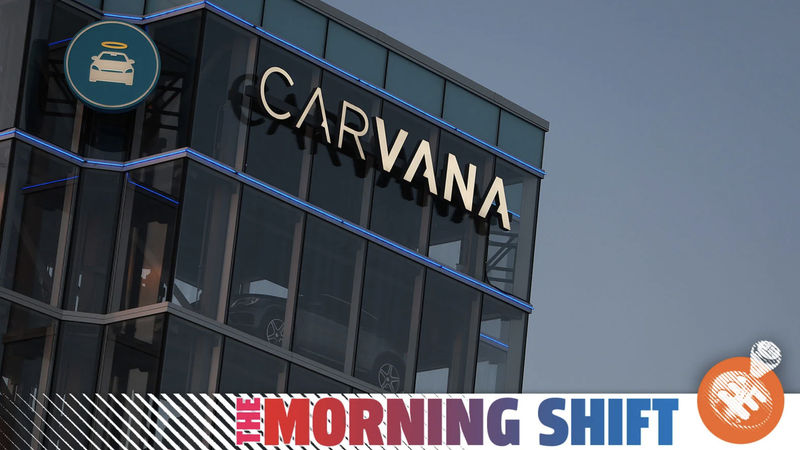Carvana Takes a Poison Pill to Avoid a Hostile Takeover

Struggling online used car retailer Carvana is doing all it can to ward off a hostile takeover — including a “poison pill” maneuver. Illinois dealers are appealing the state’s direct-to-customer EV sales ruling, and BYD is taking a cautious approach when it comes to entering the U.S. market. All these stories and more in The Morning Shift for Wednesday, January 18, 2022.
1st Gear: Carvana Swallows the Poison Pill
Carvana has reportedly adopted a “poison pill” to limit shareholders from taking over a bigger chunk of the struggling company, and ward off the threat of a hostile takeover. The company has also reached an agreement to sell up to $4 billion worth of auto loans.
Read more
The loans are being purchased by Ally Band and Ally Financial, a move that will give Carvana a fresh source of funding as it attempts to restructure its operations. From CNBC:
Carvana said the “poison pill” will help safeguard its “significant” U.S. federal net operating loss (NOLs) that could be available to offset its future taxable income.
The company’s ability to use the NOLs would be substantially limited if its 5%-shareholders increased their ownership, Carvana said.
Companies with large NOLs often adopt poison pills to enable them to cut their tax bill. Poison pills are also adopted to ward off hostile takeovers.
[...]
Carvana, which some analysts say is in financial trouble following a rapid expansion during the pandemic, set a trigger of 4.9% for the shareholder rights plan.
The plan took effect on Monday, and it is scheduled to be in place until January 15, 2026. After the news was announced, CNBC reports that the company’s stock value rose by about 6.5 percent, to slightly less than $7.50.
2nd Gear: Illinois Dealers Really Want to Kill Direct-to-Customer Auto Sales
The Illinois Automobile Dealers Association filed an appeal in Chicago challenging a court ruling from December 2022 that allows Rivian and Lucid to continue to sell their EVs directly to customers in the state. It’s a move that was expected to happen. From Automotive News:
In the Dec. 19, 2022, ruling, Associate Judge David Atkins decided the Illinois secretary of state was correct in issuing dealer licenses to the EV startups, as it previously had for Tesla Inc. The ruling opens the door for manufacturers to follow Tesla’s direct-sales model. Joe McMahon, the association’s executive director, previously told Automotive News the decision gives special treatment to EV makers.
Direct sales from manufacturers result in a monopoly with no price benefit, McMahon said in a Jan. 5 statement.
The state’s dealer association, which represents 700 dealerships, cited the Illinois Vehicle Code and Illinois Motor Vehicle Franchise Act as stating that public vehicle sales must be made through licensed and independent franchised dealers.
Atkins says that the dominant model of using franchised dealers for new car sales is in no way mandatory under state law. Despite this, McMahon confirmed the appeal was filed on the basis of these laws
“You cannot be a manufacturer and a dealer,” McMahon said. “That’s in the law so we think it’s pretty clear.”
3rd Gear: BYD’s Cautious Approach to the U.S.
Chinese electric vehicle juggernaut BYD is starting on its journey of rapid global expansion, growing substantially in just about every market — except the U.S., where BYD’s biggest rival Tesla is number one in EV sales. The Chinese automaker has reportedly spent much of the last year conducting a study on how to set up a U.S. distribution network for its electric vehicles.
It was all going according to plan... until it wasn’t. Tensions between Washington and Beijing, anti-China sentiment in the U.S., and President Biden’s priority of bolstering home-grown EVs forced BYD to push the pause button on a big announcement at CES this year. From Reuters:
BYD’s management has yet to give the project a final green light and an aggressive U.S. expansion remains unlikely for the foreseeable future, the source said.
“BYD is taking a cautious approach to the U.S.,” the person said. “Think about all the U.S.-China political tensions and then think about the craziness of the whole world now. You don’t want to jump into a big mess.”
BYD’s U.S. project was complicated by the Biden administration’s Inflation Reduction Act (IRA), which imposes rules on where to source battery materials and disqualifies EVs produced outside North America for a $7,500 purchase rebate.
“Who would start selling cars with a $7,500 disadvantage?” said another of the sources.
BYD was the world’s largest seller of EVs and plug-in hybrids 2022. It sold a total of 1.86 million vehicles, mostly in China, well ahead of Tesla’s 1.3 million vehicle sales that year.
4th Gear: DoJ Wants Airplane Covid Mask Mandates Back
The Department of Justice has reportedly asked an appeals court panel to reverse a ruling from April of 2021 that declared a government order requiring masks on airplanes, buses, trains, ride share services and at airports and other transportation hubs to be unlawful. From Reuters:

 Yahoo Autos
Yahoo Autos 